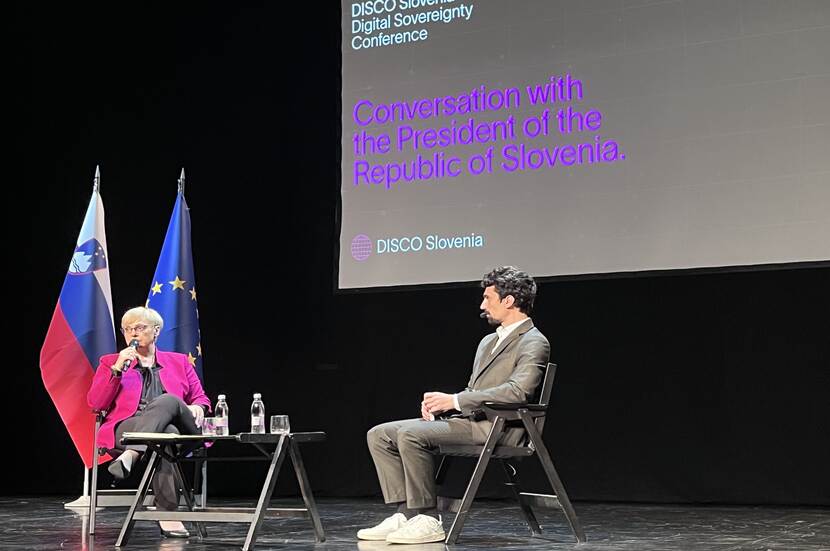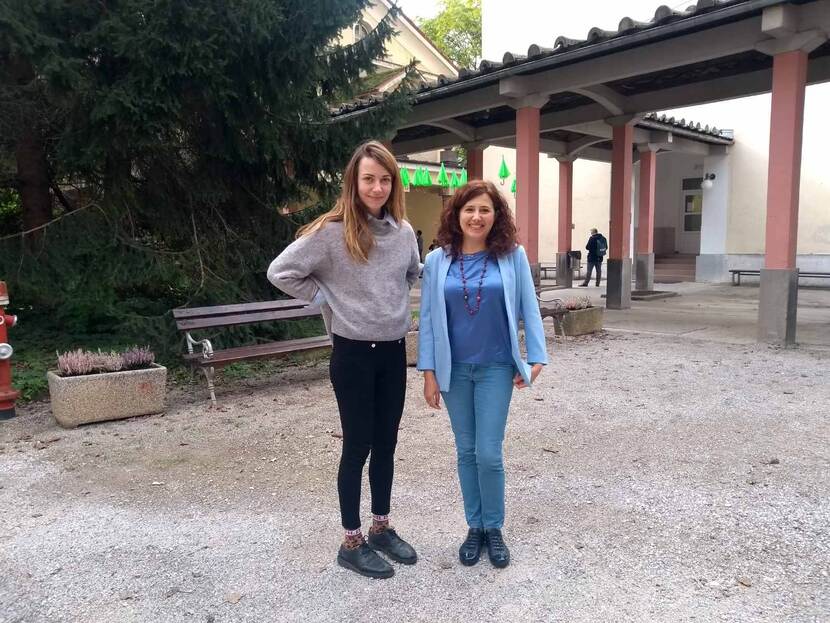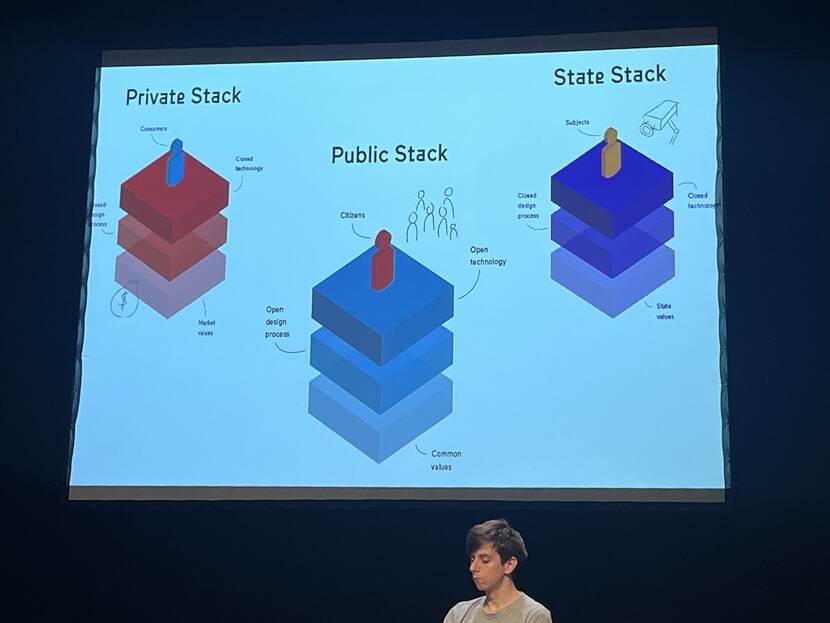Dancing with data at DISCO
Weblogs
In a world challenged by fake news, disinformation, and Artificial Intelligence, the Netherlands partnered with Slovenian NGO Today is a new day to orchestrate the Digital Sovereignty Conference (DISCO) in Slovenia. Over three days, DISCO focused on safeguarding fair access to uncorrupted data. The event kicked off with a dialogue involving the President of the Republic of Slovenia, Nataša Pirc Musar, who highlighted the importance of data access: ‘This is not a commercially interesting project for tech giants, so we have to work on it at an international level.’

DISCO fosters collaboration, uniting knowledge and people to strengthen European civil society. Thanks to the support of regional Embassies, the Netherlands granted 36 scholarships, covering conference fees and accommodation in Ljubljana. Let's introduce you to two of the scholarship recipients:
Lora Georgieva, a lawyer with over a decade of experience in Bulgaria, has transitioned from private to civic sector to join the Anti-Corruption Fund. Her motivation stems from the challenges lawyers face when tackling corrupt administration and judiciary. Lora and her team focus on comprehensive investigations on corruption-related crimes and violations, through investigative journalism, backed up with thorough legal analyses of systemic problems, concerning implementation of public function. ACF’s main mission is to provide civic education, raise awareness and contribute to lowering the tolerance to corruption in Bulgaria.
Anna Košlerová embarked on her writing career four years ago while residing in the United Kingdom. Her work with international media outlets such as The Guardian, Al-Jazeera, and Vice World News empowered her to shed light on the distressing issue of sterilizing Roma women in the Czech Republic, a practice that endured until 2009. Today, she dedicates her efforts to reporting on human rights concerns for Czech Public Radio.

Human Rights and Digital Challenges
Anna shares, ‘I've been writing about this subject since last year. Human rights and I go hand in hand." At the conference, she highlighted her concerns of surveillance and profiling. Anna found a particular discussion on recruitment profiling intriguing, noting, "They examined how recruitment profiling takes into account factors like race, gender, and even mental health. While it may seem like a 'smart' hiring approach, it can lead to discrimination. These issues are not isolated; they are part of a broader human rights concern. Racial profiling, for instance, isn't just a local issue, it's a global human rights problem that urgently needs attention due to the lack of transparency in its use by states.’
Lora underscored the significance of digital communication channels, stating, ‘Even during this conference, we've been discussing how a significant portion of the population relies on the internet and social media for information—around 70%. Traditional media like newspapers are losing their impact, making digital platforms crucial.’
Disinformation
Discussing the pressing issue of disinformation, Anna shares her personal encounters: ‘As an example, I have grandparents who often receive chain emails. Actually, before elections, we have seen this over and over again." She highlighted similar challenges in Slovakia before the last elections, as well as during conflicts like the Israel and Palestine situation. ‘It's reaching a lot of people, and it's really hard to fight it,’ Anna emphasized.
Speaking about her efforts at Czech radio: ‘We have a project dedicated to countering disinformation. We regularly dissect fake news stories, such as the recent one claiming that Brussels is forcing kids to masturbate.’
Lora recognizes this in her homeland Bulgaria, saying, ‘Disinformation is also a major problem here, with organized troll factories spreading a substantial amount of misleading content. This is very influential, with many people believing everything they read. Such misinformation can alter critical aspects of life, including election outcomes.’ Lora urges the importance of countering this disinformation for the sake of democracy.

Big Data
Discussing the pressing matter of data, Anna highlighted the significant challenges in her country: ‘It is a big issue, especially in the Czech Republic because, in general, there's very little data. For example, in other countries, the data is there and it's relatively accessible.
Especially when it comes to the sterilization of Roma women, there is almost no data. There's no state data on how often this happened, to how many women it happened, and when it happened. So I view this as highly problematic. I think it's incredibly important for the state to collect data. And the country where I'm from, we're still not there. I hope there's a change coming soon.’
Anna also points out the importance of data accessibility, adding, ‘The other side of it is if the state has data, are they making it public or not? And obviously there's a lot of data that they have, but they don't necessarily want to make it public, which is when the freedom of request for information comes into play. This is a very powerful journalistic tool. And I believe it's being used more and more.’
Lora Georgieva and her Anti-Corruption Fund team were honored with the 2021 Anti-Corruption Champion Award from the US Department of State.
Big Brother
Another pressing issue are the unregulated CCTV cameras in Bulgaria. Lora says: ‘The problem is nobody knows who put them there. And when you go and ask, everybody denies. So basically nobody knows who is taking video footage with what purpose, how long they keep them and what they do and who they provide them to.’
Lora, reflecting on the conference, remarked, ‘I attended an interesting workshop where I discovered a noteworthy practice regarding surveillance cameras. In Slovenia, after installing cameras, they are required to register them and attach a distinctive sticker. This measure aims to safeguard the data generated from the camera footage.’
She also outlined her plans for advocacy, saying, ‘We will take this back to Bulgaria and maybe even advocate for it together with other NGOs. Because it is a general issue that is important to everyone. It may not be perfect but for us it is a good start.’
